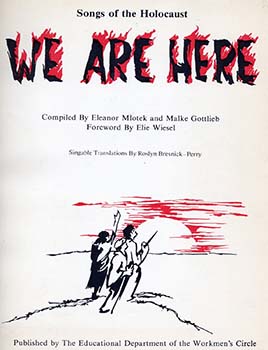A song of the Vilno ghetto. An eleven-year old boy Alexander Volkoviski wrote this prize- winning melody in a ghetto contest. Shmerke Kaczerginski (see note about author in Friling), then set words to the tune. Volkoviski, presently called Tamir, is a composer in Israel.

Quiet, quiet, let’s be silent,
Dead are growing here.
They were planted by the tyrant,
See their bloom appear.
AII the roads lead to Ponar now,
There are no roads back,
And our father too has vanished,
And with him our luck.
Still, my child, don’t cry, my jewel,
Tears no help commands,
Our pain callous people
Never understand.
Seas and oceans have their order.
Prison also has its border,
But to our plight
There is no light.
There is no light.
Spring has come, the earth receives her
Bui to us brings fall.
And the day is filled with flowers,
To us darkness calls.
Autumn leaves with gold are softened,
In us grow deep scars,
And a mother somewhere orphaned
Her child in Ponar.
Now the river too is prisoner-
Is enmeshed in pain-
While the blocks of ice tear through her,
To the ocean strain.
Still, things frozen melt, remember,
And cold winds to warmth surrender-
Future bring a smile-
So calls your child,
So calls your child.
Quiet, quiet, wells grow stronger
Deep within our hearts,
Till the gates are there no longer.
No sound must impart.
Child, rejoice not, it’s your smiling
That is not allowed,
Let the foe encounter springtime
As an autumn cloud.
Let the well flow gently onward,
Silent be and dream . . .
Coming freedom brings your father,
Slumber, child serene.
As the river liberated,
Springtime green is celebrated
Kindle freedom’s light,
It is your right,
It is your right.
Shtiler, shtiler, lomir shvaygn,
Kvorim vaksn do.
S’hobn zey farflantst di sonim:
Grinen zey tsum blo.
S’firn vegn tsu ponar tsu,
S’firt keyn veg tsurik,
lz der tate vu farshvundn,
Un mit im dos glik.
Shtiler, kind mayns, veyn nit, oytser,
S’helft nit keyn geveyn.
Undzer umglik veln sonim
Say vi nit farshteyn.
S’hobn breges oykh di yamen .
S’hobn tfises oykhet tsamen.
Nor tsu undzer payn
Keyn bisl shayn.
Keyn bisl shayn.
Friling afn land gekeumen, —
Un undz harbst gebrakht.
Iz der tog haynt ful mit blumen, —
Undz zeet nor di nakht.
Goldikt shoyn der harbst af shtamen, —
Blit in undz der tsar;
Blaybt faryosemt vu a mame:
S’kind geyt af ponar.
Vi di vilye a geshmidte —
T’oykh geyokht in payn, —
Tsien kries ayz durkh ite
Itst in yam arayn.
S’vert der khoyshekh vu tserunen,
Fun der fintster laykhtn zunen —
Rayter, kum geshvind,
Dikh ruft dayn kind,
Dikh ruft dayn kind.
Shtiler, shtiler, s’kveln kvaln
Undz in harts arum,
Biz der toyer vet nit falm
Zayn mir muzn shtum.
Frey nit, kind, zikh, s’iz dayn shmeykhl
Itst far undz farrat.
Zen dem filing zol der soyne
Vi in harbst a blat.
Zol der kval zikh ruik flisn,
Shtil zay un hof. . .
Mit der faryheyt kumt der tate,
Shlof zhe, kind mayn, shlof.
Vi di vilye a bafrayte,
VI di bbeymer grin banayte
Laykht balt frayheyts likht
Af dayn gezikht,
Af dayn gezikht.
שטילער, שטילער, לאָמיר שװײַגן,
קבֿרים װאַקסן דאָ.
ס׳האָבן זײ פֿאַרפֿלאַנצט די שׂונאים:
גרינען זײ צום בלאָ.
ס׳פֿירן װעגן צו פּאָנאַר צו,
ס׳פֿירט קײן װעג צוריק,
איז דער טאַטע װוּ פֿאַרשװוּנדן,
און מיט אים דאָס גליק.
שטילער, קינד מײַנס, װײן ניט, אוצר,
ס׳העלפֿט ניט קײן געװײן,
אונדזער אומגליק װעלן שׂונאים,
סײַ װי ניט פֿאַרשטײן.
ס׳האָבן ברעגעס אױך די ימען,
ס׳האָבן תּפֿיסות אױכעט צאַמען,
נאָר צו אונדזער פּײַן
קײן ביסל שײַן,
קײן ביסל שײַן.
פֿרילינג אױפֿן לאַנד געקומען, —
און אונדז האַרבסט געבראַכט.
איז דער טאָג הײַנט פֿול מיט בלומען, —
אונדז זעט נאָר די נאַכט.
גאָלדיקט שױן דער האַרבסט אױף שטאַמען, —
בליט אין אונדז דער צער:
בלײַבט פֿאַריתומט װוּ אַ מאַמע;
ס׳קינד גײט אױף פּאָנאַר.
װי די װיליִע אַ געשמידטע —
ט׳אױך געיאָכט אין פּײַן, —
ציִען קריִעס אײַז דורך ליטע
איצט אין ים אַרײַן.
ס׳װערט דער חושך װוּ צערונען,
פֿון דער פֿינצטער לײַכטן זונען —
רײַטער, קום געשװינד, —
דיך רופֿט דײַן קינד,
דיך רופֿט דײַן קינד.
שטילער, שטילער, ס׳קװעלן קװאַלן
אונדז אין האַרץ אַרום,
ביז דער טױער װעט ניט פֿאַלן
זײַן מיר מוזן שטום.
פֿרײ ניט, קינד, זיך, ס׳איז דײַן שמײכל
איצט פֿאַר אונדז פֿאַרראַט,
זען דעם פֿרילינג זאָל דער שׂונא
װי אין האַרבסט אַ בלאַט.
זאָל דער קװאַל זיך רויִק פֿליסן,
שטילער זײַ און האָף. . .
מיט דער פֿרײַהײט קומט רער טאַטע,
שלאָף זשע, קינד מײַן, שלאָף,
װי די װיליִע אַ באַפֿרײַטע,
װי די בײמער גרין־באַנײַטע
לײַכט באַלד פֿרײַהײטס־ליכט
אױף דײַן געזיכט,
אױף דײַן געזיכט.
Song Title: Shtiler, Shtiler

Compiled by sisters Malke Gottleib and Chana Mlotek, this collection of 40 songs, issued on the occasion of the 40th anniversary of the Warsaw Ghetto Uprising, reflects the suffering, despair, longing, as well as the strength, hope and courage that led the last remnant of enfeebled Jews to take up arms against the mammoth Nazi war-machine. Save for five songs, this compilation comprises songs that were actually written or sung in the ghettos and concentration camps. Four exceptions written after the war: “Babi Yar,” “Moyshelekh un Shloymelekh,” “Kadish,” and “Mayn mame hot gevolt zayn oyf mayn khasene” are often presented at commemorative gatherings and were therefore included. The fifth song “Am Yisroel Khay” was written in a D.P. camp and is an affirmation of the will of the survivors to build new lives for themselves, holding high their belief in the endurance of the Jewish people. To enable readers and singers not conversant with the Yiddish alphabet to utilize this collection, We Are Here! Songs of the Holocaust provides parallel transliterations and singable English translations by Roslyn Bresnick Perry.